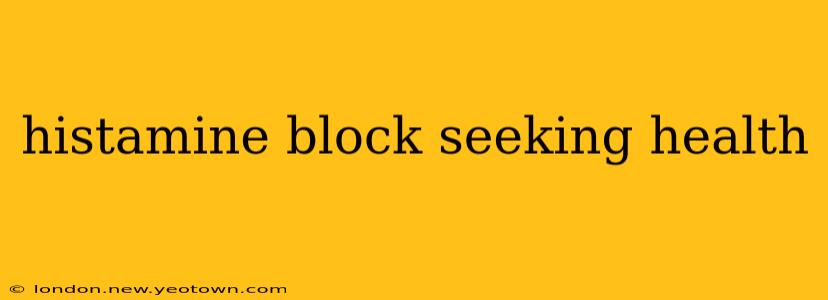For years, I suffered silently. Headaches that pulsed like a maddening drumbeat, a skin that itched relentlessly, and a digestive system that felt like a battlefield. Doctors offered shrugs and generic advice, leaving me feeling lost and frustrated. Then, I stumbled upon the word: histamine. It was the key that unlocked the door to understanding my suffering, and it led me on a journey to reclaim my health. This journey involved learning about histamine intolerance and finding the right histamine blockers. This is my story, and hopefully, it can help you on your own path to wellness.
What is Histamine Intolerance?
Histamine is a vital chemical messenger in our bodies. It plays a critical role in immune responses, digestion, and even brain function. However, some people have difficulty properly metabolizing histamine. This leads to a buildup of histamine in the body, triggering a wide range of symptoms. This is known as histamine intolerance, and it's often misunderstood and misdiagnosed. It's not a true allergy, but rather a problem with the body's ability to break down histamine efficiently.
What are the Symptoms of Histamine Intolerance?
The symptoms of histamine intolerance are incredibly diverse, which is part of what makes diagnosis so challenging. They can mimic a multitude of other conditions, often leading to a frustrating diagnostic odyssey. Some common symptoms include:
- Headaches: Migraines, tension headaches, or persistent dull aches.
- Skin Issues: Itching, hives (urticaria), eczema, and psoriasis.
- Digestive Problems: Bloating, abdominal pain, diarrhea, and constipation.
- Respiratory Issues: Runny nose, sneezing, and congestion.
- Mental Symptoms: Anxiety, depression, and difficulty concentrating.
How Do I Know If I Have Histamine Intolerance?
Many people struggle to get a clear diagnosis for histamine intolerance because it is difficult to test for directly. There isn't a single definitive test. Instead, doctors usually rely on a process of elimination and careful consideration of symptoms and patient history. Keeping a detailed food diary can be extremely helpful in identifying trigger foods.
What are Histamine Blockers?
Histamine blockers are substances that either reduce the production of histamine or inhibit its effects. These can come in various forms, including:
- Medications: Antihistamines are the most common medications used to manage histamine-related symptoms. However, long-term use of some antihistamines can have side effects.
- Dietary Changes: This is often the cornerstone of managing histamine intolerance. Eliminating high-histamine foods from your diet can drastically reduce symptoms.
- Supplements: Certain supplements, such as DAO (diamine oxidase) enzyme supplements, can help improve the body's ability to break down histamine.
What Foods Should I Avoid if I Have Histamine Intolerance?
This is a crucial question, and the answer depends on individual sensitivity. However, some foods are consistently identified as high in histamine or as histamine releasers:
- Fermented Foods: Aged cheeses, sauerkraut, kimchi, and certain types of pickles.
- Processed Meats: Salami, bacon, and sausage.
- Alcohol: Particularly red wine and beer.
- Certain Vegetables: Spinach, tomatoes, and eggplant.
- Seafood: Tuna, mackerel, and sardines.
- Citrus Fruits: Oranges, lemons, and grapefruit.
What Foods are Low in Histamine?
Focusing on low-histamine foods is just as important as avoiding high-histamine foods. Fresh, minimally processed foods are usually the best choice:
- Fresh fruits (excluding citrus): Bananas, melons, and berries.
- Fresh vegetables (excluding high-histamine options): Carrots, cucumbers, and zucchini.
- Freshly cooked meats: Chicken, turkey, and lamb (avoiding leftovers).
- Rice and potatoes.
What Supplements Can Help With Histamine Intolerance?
Supplements are often employed to support the body's natural ability to manage histamine levels. However, it's essential to talk to a doctor before starting any supplement regimen to ensure they're appropriate for your individual health status:
- DAO (Diamine Oxidase) enzyme: This enzyme helps break down histamine.
- Quercetin: An antioxidant with anti-inflammatory properties.
- Vitamin C: Plays a role in collagen production and wound healing, both important in managing some symptoms.
Is Histamine Intolerance a Serious Condition?
While not life-threatening, histamine intolerance can significantly impact quality of life. Untreated, the persistent symptoms can lead to chronic fatigue, anxiety, and depression. The severity varies greatly from person to person.
My journey with histamine intolerance has been transformative. It's been about understanding my body, adapting my diet, and seeking support from healthcare professionals who truly understand this often-overlooked condition. Remember, this information is for educational purposes and isn't a substitute for professional medical advice. Always consult with a healthcare provider before making any significant dietary changes or starting new supplements. Your journey to better health is unique; let's work together to find the path that works best for you.

